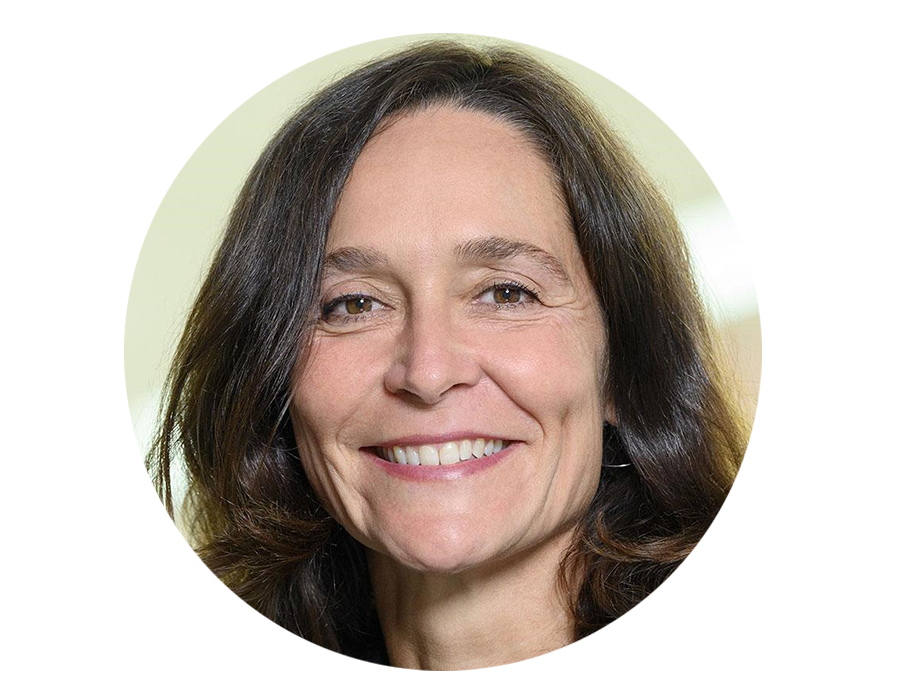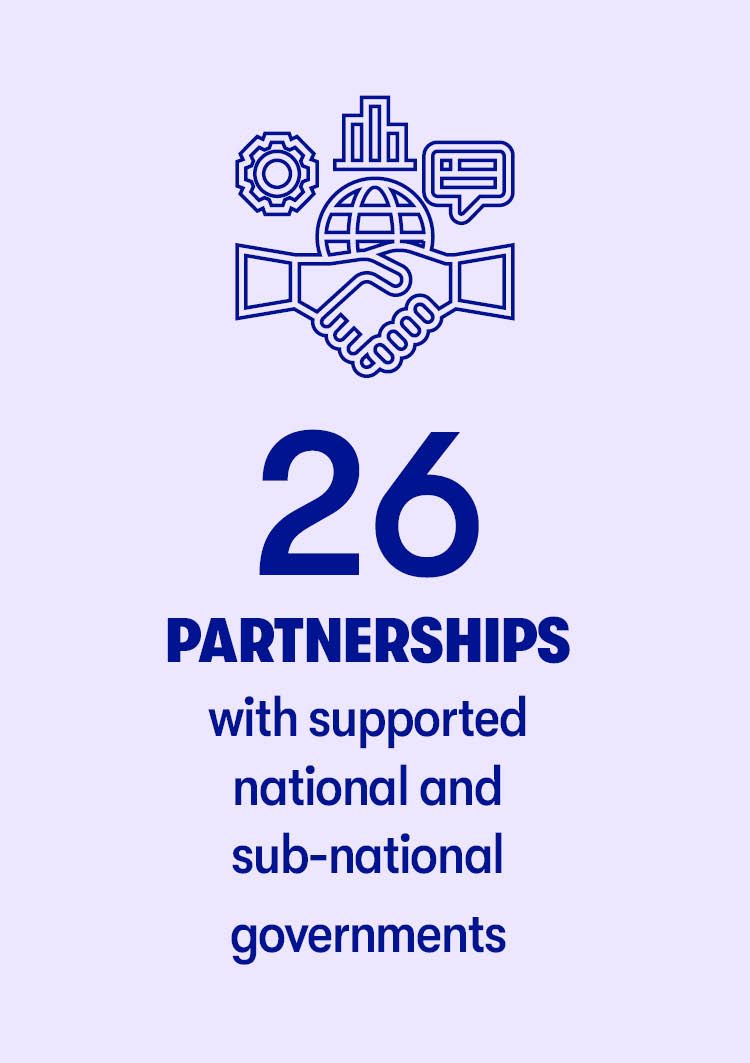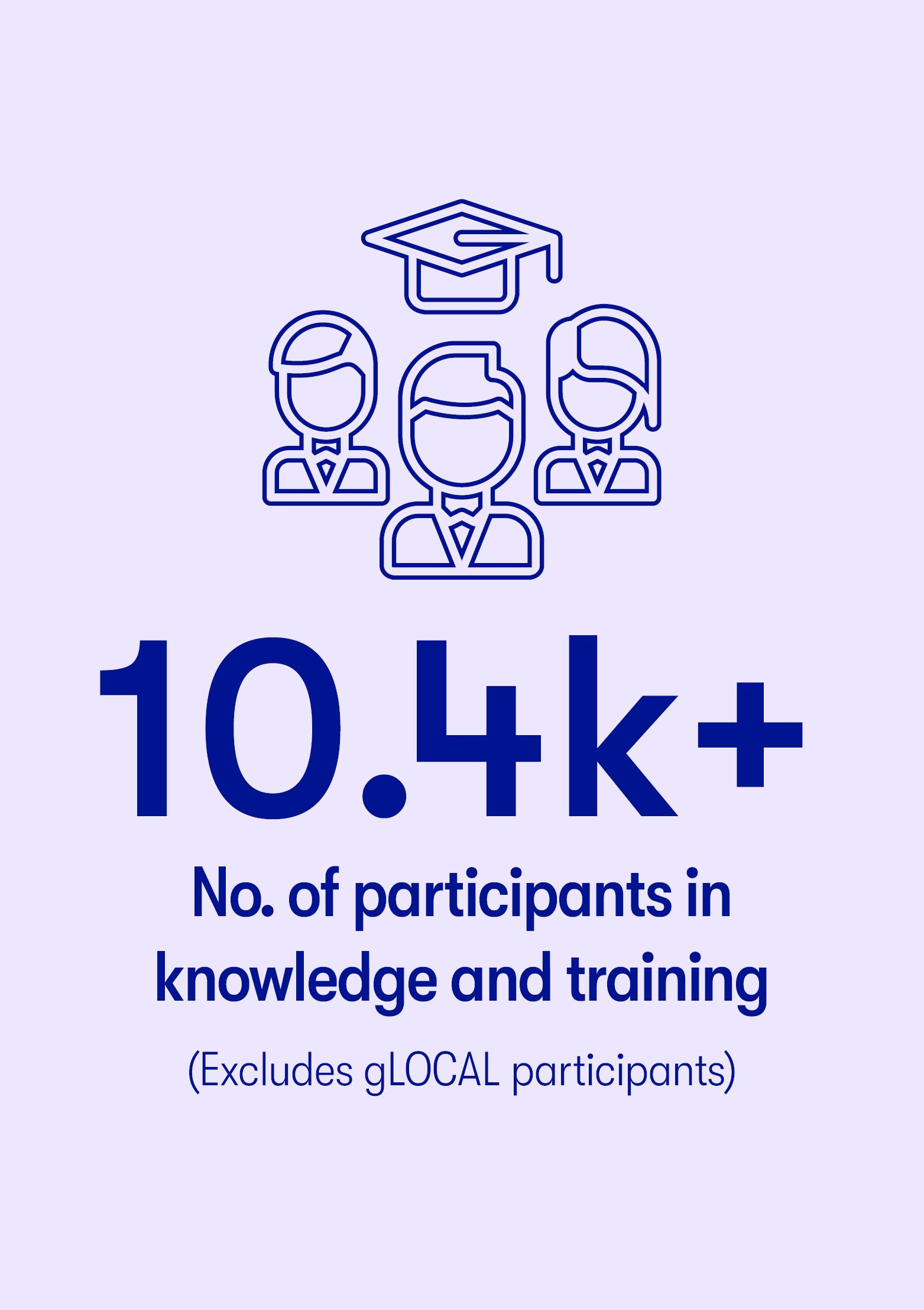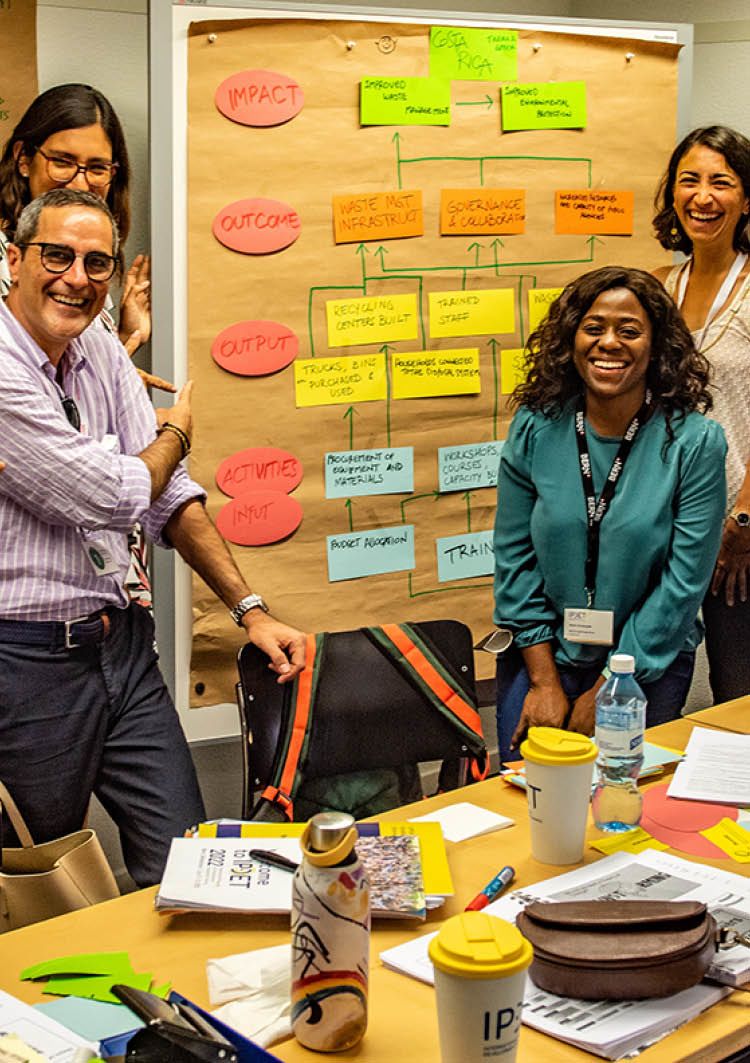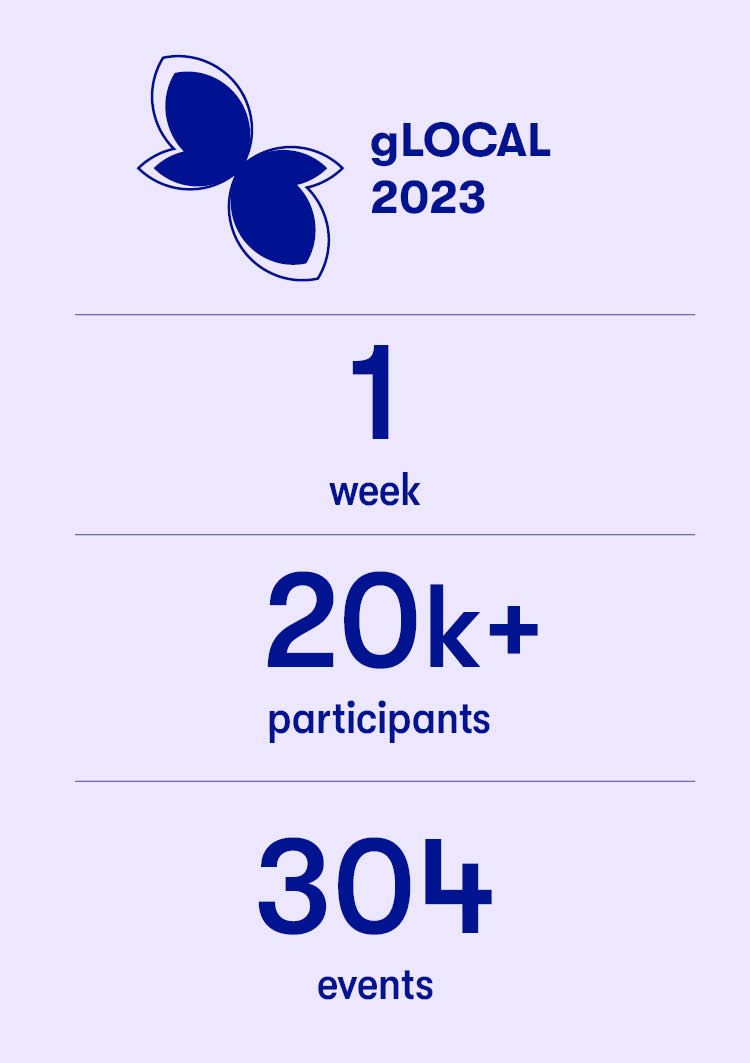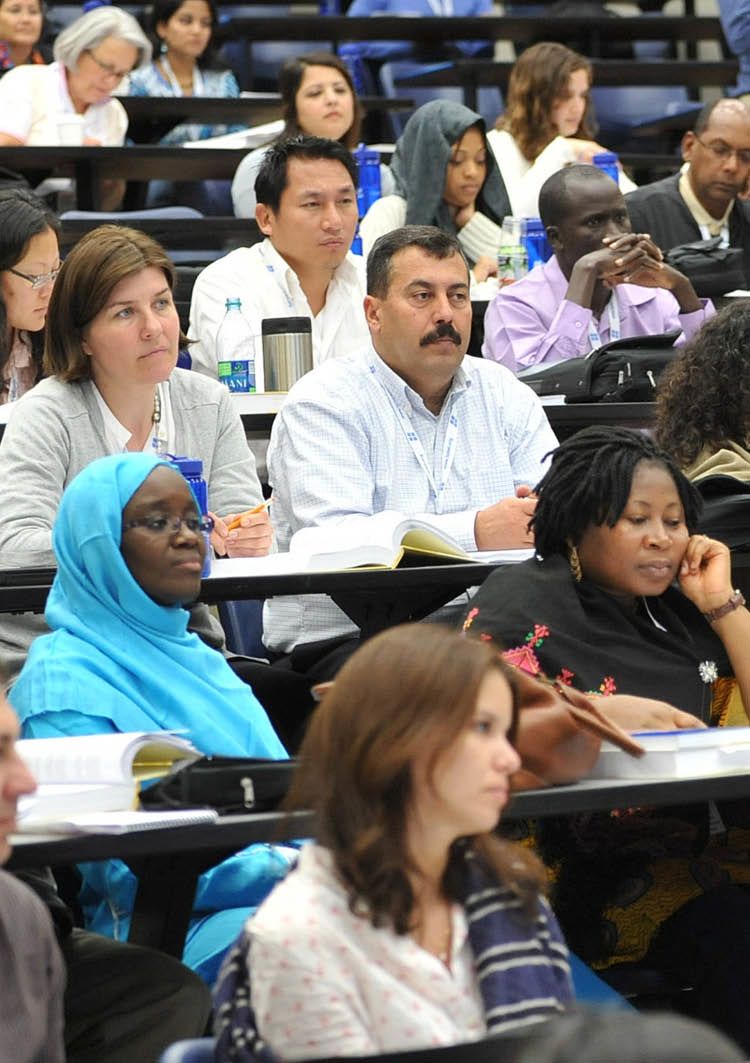GEI Annual Report
April 2022 - June 2023
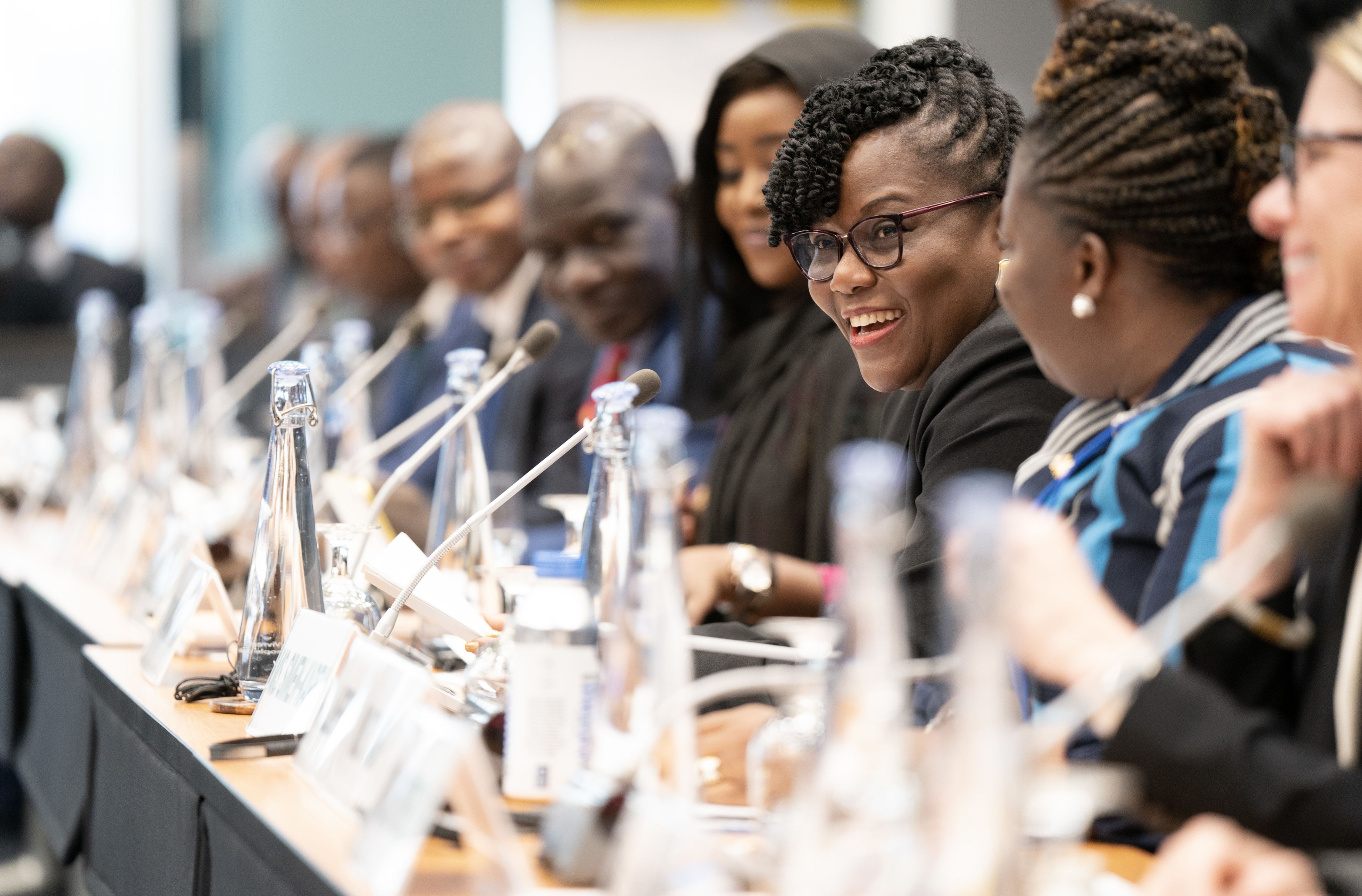
Sabine Bernabè
Sabine Bernabè
Sabine Bernabè
Director-General, Evaluation, Vice President, World Bank Group
I am happy to welcome you to the second edition of the Global Evaluation Initiative’s (GEI) annual report. As the Independent Evaluation Group (IEG) commemorates its fiftieth year, our work supporting countries with Evaluation Capacity Development (ECD) continues to be a key component of our mission. Since its inception, IEG has helped countries establish national evaluation processes of their own, supporting evidence-informed policymaking, effective governance, and monitoring of development goals. In 2020, we joined with UNDP to launch the GEI to meet the increasing demand for ECD around the world. In its third year of operation, GEI has shown itself to be a successful international partnership, harnessing the vision and expertise of its members to champion accountability and continuous learning through approaches tailored to each context. GEI is a true evolution of IEG’s ECD work. Providing strategic direction to the global network of Centers for Learning on Evaluation and Results (CLEARs), and collaborating closely with IPDET and ENAP, and its many Associate Partners and donors, GEI supports countries that are eager and determined to make better decisions. GEI‘s systems-based approach in each country reduces fragmentation of efforts and nurtures partnerships to maximize results - a crucial approach when countries and donors are faced with tough funding choices to address today’s polycrisis. In a time of competing priorities, understanding what is making a difference, makes all the difference. If you agree, we invite you to join us.
Sabine Bernabè
Director-General, Evaluation, Vice President, World Bank Group
I am happy to welcome you to the second edition of the Global Evaluation Initiative’s (GEI) annual report. As the Independent Evaluation Group (IEG) commemorates its fiftieth year, our work supporting countries with Evaluation Capacity Development (ECD) continues to be a key component of our mission. Since its inception, IEG has helped countries establish national evaluation processes of their own, supporting evidence-informed policymaking, effective governance, and monitoring of development goals. In 2020, we joined with UNDP to launch the GEI to meet the increasing demand for ECD around the world. In its third year of operation, GEI has shown itself to be a successful international partnership, harnessing the vision and expertise of its members to champion accountability and continuous learning through approaches tailored to each context. GEI is a true evolution of IEG’s ECD work. Providing strategic direction to the global network of Centers for Learning on Evaluation and Results (CLEARs), and collaborating closely with IPDET and ENAP, and its many Associate Partners and donors, GEI supports countries that are eager and determined to make better decisions. GEI‘s systems-based approach in each country reduces fragmentation of efforts and nurtures partnerships to maximize results - a crucial approach when countries and donors are faced with tough funding choices to address today’s polycrisis. In a time of competing priorities, understanding what is making a difference, makes all the difference. If you agree, we invite you to join us.
Isabelle Mercier
Director, Independent Evaluation Office, UNDP
The field of monitoring and evaluation (M&E) is inherently optimistic. M&E is not just about collecting data or checking a box - it is about empowering evidence-informed decision-making that helps drive positive change. Strong M&E systems help governments collect and use data for evidence that enhances policy decisions, supports sustainability, reduces inequality, and improves lives. The Turin Agenda, an action framework that was the result of the 2022 National Evaluation Capacities Conference, emphasizes that national M&E systems should be led by national governments; thereby ensuring they have ownership over their own development process. Although many countries have successfully monitored and reported on work funded by outside donors, many still struggle with integrating evaluation and evidence into national planning cycles.
In light of this, development organizations and funders are increasingly focusing on building M&E capacity in the countries where they operate. This means developing local expertise to improve local systems and establishing legal frameworks that will lead to better accountability and transparency in the long run.
UNDP co-founded the GEI three years ago because robust M&E systems are critical, especially in times of crisis. GEI Partners understand that supporting countries with navigating today’s challenges with the power of evidence is essential.
Isabelle Mercier
Isabelle Mercier
Isabelle Mercier
Director, Independent Evaluation Office, UNDP
The field of monitoring and evaluation (M&E) is inherently optimistic. M&E is not just about collecting data or checking a box - it is about empowering evidence-informed decision-making that helps drive positive change. Strong M&E systems help governments collect and use data for evidence that enhances policy decisions, supports sustainability, reduces inequality, and improves lives. The Turin Agenda, an action framework that was the result of the 2022 National Evaluation Capacities Conference, emphasizes that national M&E systems should be led by national governments; thereby ensuring they have ownership over their own development process. Although many countries have successfully monitored and reported on work funded by outside donors, many still struggle with integrating evaluation and evidence into national planning cycles.
In light of this, development organizations and funders are increasingly focusing on building M&E capacity in the countries where they operate. This means developing local expertise to improve local systems and establishing legal frameworks that will lead to better accountability and transparency in the long run.
UNDP co-founded the GEI three years ago because robust M&E systems are critical, especially in times of crisis. GEI Partners understand that supporting countries with navigating today’s challenges with the power of evidence is essential.
Dugan Fraser
Dugan Fraser
Dugan Fraser
Program Manager,
Global Evaluation Initiative
In this edition of our Annual Report, I am proud to share with you not only highlights of GEI’s work over the last 15 months but also a number of reflections from our efforts to help countries strengthen their national M&E systems.
As we continue to delve deeper into our support to countries, it is becoming more evident than ever that today’s development challenges are complicated and intertwined. Collaboration between stakeholders and the reduction of silos is urgently needed. Donors must communicate and find ways to collaborate; not doing so has the potential to create inefficiencies, fragment efforts, and wasted resources. To avoid these hazards, GEI prioritizes building relationships with – and between – all key M&E stakeholders, including external donors, government decision-makers, and civil society organizations alike in each country where we work.
If you value the power of evidence to improve lives and agree that we must reduce fragmentation in the development community, we ask you to join our Initiative. If you share our passion for transformation and if you believe in the potential of evidence to empower systems to reinvent themselves, then we need your support.
Dugan Fraser
Program Manager,
Global Evaluation Initiative
In this edition of our Annual Report, I am proud to share with you not only highlights of GEI’s work over the last 15 months but also a number of reflections from our efforts to help countries strengthen their national M&E systems.
As we continue to delve deeper into our support to countries, it is becoming more evident than ever that today’s development challenges are complicated and intertwined. Collaboration between stakeholders and the reduction of silos is urgently needed. Donors must communicate and find ways to collaborate; not doing so has the potential to create inefficiencies, fragment efforts, and wasted resources. To avoid these hazards, GEI prioritizes building relationships with – and between – all key M&E stakeholders, including external donors, government decision-makers, and civil society organizations alike in each country where we work.
If you value the power of evidence to improve lives and agree that we must reduce fragmentation in the development community, we ask you to join our Initiative. If you share our passion for transformation and if you believe in the potential of evidence to empower systems to reinvent themselves, then we need your support.
GEI Implementing Partner Acronyms
|
CLEAR |
Center for Learning on Evaluation and Results |
|
CLEAR-AA |
Anglophone Africa Center; located in Johannesburg, South Africa and hosted by the University of Witwatersrand. |
|
CLEAR-FA |
Francophone Africa Center; located in Dakar, Senegal and hosted by the Centre Africain d’Etudes Supérieures en Gestion (CESAG). |
|
CLEAR-LAB |
Lusophone Africa and Brazil Center; located in São Paulo, Brazil and hosted by the São Paulo School of Economics at Fundação Getulio Vargas (FGV EESP). |
|
CLEAR-LAC |
Starting in 2024, the new center for Latin America and the Caribbean will be based in Santiago, Chile and will be hosted by the Catholic University of Chile. |
|
CLEAR-PCA |
Pakistan and Central Asia Center; located in Lahore, Pakistan and hosted by the Centre for Economic Research in Pakistan (CERP). |
|
CLEAR-SA |
South Asia Center; located in New Delhi, India and hosted by the Abdul Latif Jameel Poverty Action Lab. |
|
IPDET |
International Program for Development Evaluation Training |
|
ENAP |
École Nationale d’Administration Publique |
Reflections
Over the last reporting period, the Global Evaluation Initiative (GEI), a network of organizations and experts, made significant strides on its mission to help strengthen national monitoring and evaluation (M&E) systems, focusing support on efforts that were country-owned and aligned with local needs, goals, and perspectives.
GEI continued to deepen its work with a diverse set of twenty-four countries and sub-national entities, including four countries affected by fragility, conflict, and violence (FCV). From providing advisory services and technical assistance to conducting training sessions and facilitating professional development activities, GEI offered support that was strategically chosen and tailored to each country’s context. Integrated into this support was also a focus on empowering decision-makers to tackle today’s global issues like climate change, gender inequality, and the role of youth.
GEI’s Monitoring and Evaluation Systems Analysis (MESA) diagnostic instrument continued to be an important tool for GEI’s work with countries by allowing the exploration of national M&E systems in a systematic way. During this reporting period, GEI completed three new MESAs and began the process to carry out several others in FY24.
Before a MESA is conducted, GEI Implementing Partners play a critical role in the field by bringing stakeholders together, facilitating communication, and identifying synergies. During the past 15 months, more efforts were made to involve ministries of finance in M&E system strengthening. This stakeholder group will continue to be a significant focus for GEI going forward, as this helps to ensure that M&E systems are relevant, credible, and used for decision-making.
The GEI Network continued to deliver training and professional development activities embedded in its country engagement work and through flagship training programs, including IPDET, PIFED, and TAQYEEM. GEI Implementing Partners also delivered a variety of customized training programs to strategic partners all over the world. Over the last 15 months, almost 3000 people received training from the GEI Network.
Globally, GEI’s efforts around knowledge sharing are connecting people and building a movement that values the power of evidence to improve lives. The UNDP-IEO’s National Evaluation Capacities Conference, which GEI co-hosted, reinforced the need to strengthen national M&E systems to achieve impacts at the country level and delivered a collective commitment with the Turin Agenda. Through GEI’s revamped knowledge platform, BetterEvaluation, as well as gLOCAL Evaluation Week, and other online events, GEI provided platforms for people to meet, share challenges, and learn from each other. GEI’s online events and conferences saw over 20,000 participants in the reporting period and BetterEvaluation had almost 1.9 million page views.
With much appreciation to all partners, donors and collaborators, GEI looks forward to continuing its work in FY24, supporting more countries with embracing the power of evidence to transform systems and improve lives.

- BL1 -
Country Partnerships

GEI provides national and sub-national governments with support to strengthen monitoring, evaluation and the use of evidence in their countries. Applying an integrated systems-based approach, GEI provides diagnostic, technical, and other advisory support services to help governments at every step on their journey. From helping to define needs, goals and opportunities, to suggesting solutions tailored to the local context, to supporting implementation.
The GEI’s approach, in principle, is based on a model with several steps (illustrated in the figure below). The steps include doing a diagnostic study - usually, GEI’s Monitoring and Evaluation Systems Analysis (MESA) - and preparing and supporting the implementation of a capacity development plan or systems strengthening strategy. Throughout this process, nurturing partnerships – with government and in-country M&E stakeholders, development partners and other evaluation capacity development actors – is key. Similarly, developing, curating and sharing knowledge are fundamental to the GEI approach and are emphasized in each step.
Fig. 1 - GEI Country ENGAGEMENT Model

This model represents GEI’s strategic approach to support systems-based change. However, each country engagement will have its own context to which the model will need to be adapted (i.e., sometimes steps will not be done in sequence).
Fig. 2 - GEI Country Program Status Update (as of June 2023)

GEI provides national and sub-national governments with support to strengthen monitoring, evaluation and the use of evidence in their countries. Applying an integrated systems-based approach, GEI provides diagnostic, technical, and other advisory support services to help governments at every step on their journey. From helping to define needs, goals and opportunities, to suggesting solutions tailored to the local context, to supporting implementation.
The GEI’s approach, in principle, is based on a model with several steps (illustrated in the figure below). The steps include doing a diagnostic study - usually, GEI’s Monitoring and Evaluation Systems Analysis (MESA) - and preparing and supporting the implementation of a capacity development plan or systems strengthening strategy. Throughout this process, nurturing partnerships – with government and in-country M&E stakeholders, development partners and other evaluation capacity development actors – is key. Similarly, developing, curating and sharing knowledge are fundamental to the GEI approach and are emphasized in each step.
Fig. 1 - GEI Country ENGAGEMENT Model

This model represents GEI’s strategic approach to support systems-based change. However, each country engagement will have its own context to which the model will need to be adapted (i.e., sometimes steps will not be done in sequence).
Fig. 2 - GEI Country Program Status Update (as of June 2023)

GEI Country Engagement Model:
Examples of Country Activities
"Step 1: Creating a Partnership"
The first step in GEI’s Country Engagement Model involves connecting and convening national M&E stakeholders to build trust and create a partnership. This step looks different from country to country. It can include initial technical advisory services, training, and advocacy.
Cote d’Ivoire: The Ministry of Planning and Development, CLEAR-FA, and UNICEF, have developed a “road map” to operationalize the national law on public policy evaluation that was adopted in June 2022 and a national evaluation forum is being planned to engage with more M&E stakeholders. CLEAR-FA is also supporting the Ministry of Planning in setting up a National Evaluation Fund, which will be instrumental for the development of country-led evaluations.
Pakistan: CLEAR-PCA carried out a set of preliminary activities to establish a working relationship with the Pakistan Ministry of Planning, Development, and Special Initiatives, which led to the signing of an A MOU with the Ministry in August 2022. A customized three-day M&E boot camp for Planning Commission Staff was delivered in September 2022 as one of the first activities agreed to in the MOU.
Congo: CLEAR-FA signed a partnership agreement with the Ministry for State Reform and the Association Congolaise d’Evaluation (ACE) in September 2022. The Minister for State Reform and some of his advisors attended the National Evaluation Capacities (NEC) Conference in October 2022. CLEAR-FA is also implementing training activities for the Centre National d’Etude et d’Evaluation des Projets d’Investissement Public (CNEEPIP), in collaboration with the World Bank’s Development Impact Evaluation (DIME) group. The first training was held in late 2022. (See “Reflections on … Working in FCV Contexts”.)
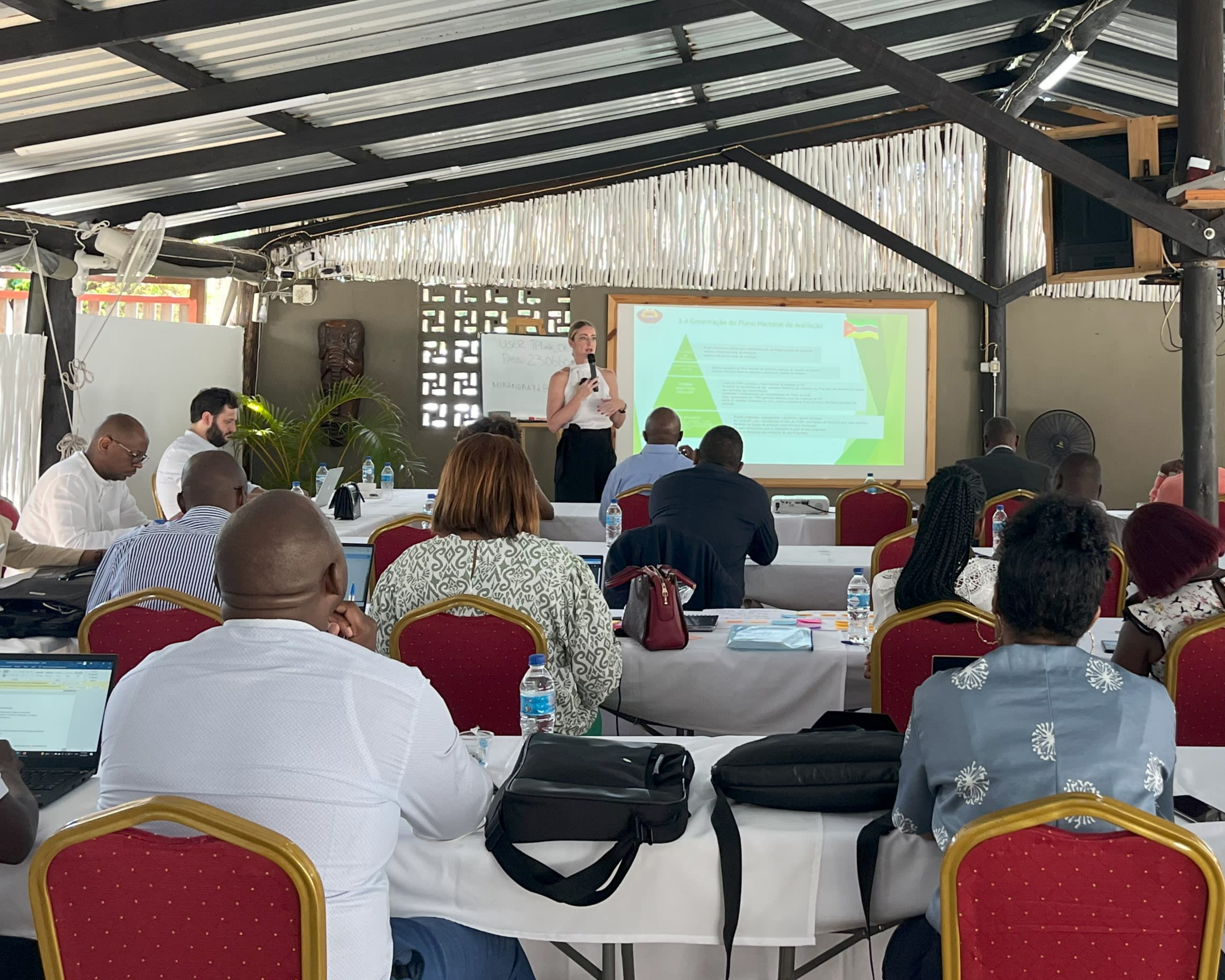
Reflection on..
Working in FCV contexts
GEI Implementing Partners have worked in several FCV (fragile, conflict, or violence affected) countries, navigating the accompanying complexities, unique challenges, and sensitivities.
Time Must Be Invested in Building Trust and Local Partnerships: In an environment that is often marked by mistrust and tension, establishing trust and mutual understanding among stakeholders is crucial. Informal, discreet conversations and efforts to bridge communication gaps are important in the initial stages of engagement. Understanding which key decision-makers must be prioritized from the start can pave the way for successful engagement with others. Local partners, such as the Association Congolaise d’Evaluation (ACE) which is partnering with CLEAR-FA in Congo, can play a pivotal role in navigating this intricate political landscape. Leveraging their connections with government officials and donor partners can facilitate engagement and create opportunities for raising awareness among M&E system stakeholders. (These necessary efforts often make work in FCV contexts a longer engagement than in other countries.)
The Narrative Around “Evaluation” Must be Delicately Crafted: In FCV contexts, where political sensitivities may be running high, it’s necessary to carefully frame the concept of “evaluation.” Stressing its value for learning rather than strict accountability can help gain political acceptance and cooperation. Emphasizing independence and avoiding association with any political agenda is imperative in building credibility and fostering collaboration.
Expect Financing Challenges: Securing funding for initiatives in FCV contexts can be particularly challenging. Compared to other countries, Congo, for instance, has faced difficulties in obtaining support from development partners for national M&E strengthening activities. Donors are often less willing to fund long-term projects in FCV countries due to high levels of risk and instability, uncertain outcomes, and weak institutional capacity, among other factors, leading to a preference for short-term humanitarian assistance.
Assessing and Addressing Low M&E Capacity is Necessary: Recognizing that M&E capacity in FCV contexts is relatively lower than in other countries, conducting assessments like the MESA (Monitoring and Evaluation System Assessment) becomes imperative. Such assessments offer valuable insights into the existing capacity gaps and provide a foundation for future capacity-building efforts. They also help strengthen relationships between stakeholders.
"Step 2: Diagnostics" and "Step 3: Capacity Development Strategy"
The Monitoring and Evaluation Systems Analysis (MESA) tool is a key part of GEI’s integrated systems-based approach to supporting developing countries on their journey to strengthen monitoring, evaluation, and evidence use. Based on MESA recommendations, a capacity development plan and/or systems strengthening strategy is developed. Although the MESA process is meant to surface data and information to be used for further improvements to the national M&E systems, it often serves as a critical component of system strengthening (see “Reflections on … MESA”).
During this reporting period, GEI teams supported the delivery of three MESAs with accompanying capacity development plans and/or systems-strengthening strategies in Colombia, the Solomon Islands, and Brazil.
Colombia: GEI has been providing targeted support to Colombia’s National Department of Planning (DNP). To complement the findings of the National Evaluation Capacities Index (INCE) diagnostic conducted in 2022, GEI conducted a “mini-MESA”- a custom diagnostic to measure the use and uptake of evaluation findings across the Colombian public sector. Based on the findings of this diagnostic, GEI is now developing guidance for the use of evaluations and will advise the DNP on how to develop an indicator for the use of evaluations.
Solomons Islands: GEI supported the implementation of the MESA in late 2022. A consortium of consulting firms helped to conduct the MESA in collaboration with the Ministry of National Planning and Development Coordination (MNPDC) and in consultation with Solomon Islands’ national and provincial governments, non-government organizations, civil sector organizations, faith-based organizations, donors, and development partners. The MESA findings will inform the strengthening of national M&E systems and capacities under the National Development Strategy (NDS) 2016–2035.
Brazil – City of Recife: In December 2022, CLEAR-LAB helped to conduct a MESA in the City of Recife. The MESA results were used to recommend actions to structure the municipal evaluation policy and strengthen the Center for Evaluation of Public Policies and Data Science (NAPCD) of the City of Recife.

Reflection on..
MESA
After several years of implementing the MESA, it is clear that the diagnostic process plays a pivotal role in the journey to strengthen national M&E systems.
MESA Process Reduces Fragmentation: A pivotal aspect of working toward system-change is reducing fragmentation among stakeholders, especially in complex, interconnected M&E systems. GEI often hears feedback from government counterparts that the MESA exercise has helped them establish connections with people they recognized as important to engage with but had not done so before. In some instances, the MESA process has sparked and improved coordination among different agencies or ministries of the same government for the first time. For example, in the Solomon Islands, the MESA results facilitated the creation of working groups across ministries to run a coordinated M&E exercise for the first time.
MESA Process Helps Increase Collaboration with Donors: The MESA process has created a space to collaborate and work in partnership with other international organizations, such as UNDP (Bhutan and Solomon Islands), UNICEF (Odisha/India), and IFAD (Uzbekistan) to support national governments with coordinated analysis and action plans on systems strengthening.
"Step 4: Systems Strengthening"
The heart of GEI’s work is assisting governments with implementing the capacity development plan and/or systems strengthening strategy that is developed from the findings of the diagnostic. This support can include tailored technical assistance and advisory support, customized training, and professional development opportunities. The diversity of the GEI Network helps GEI Partners leverage each other’s expertise and deliver support that is informed by other countries’ experiences but is tailored to specific country needs and contexts.
India: CLEAR-SA supported India’s Development Monitoring and Evaluation Office (DMEO) with a range of technical advisory services such as developing notes and toolkits on outcome-based budgeting and administrative data, giving inputs on the Data Governance Quality Index (DGQI), and conducting a series of training workshops for staff to better equip them to conduct country-led evaluations. Under its partnership with the Government of India’s civil service training institute on public administration, Lal Bahadur Shastri National Academy of Administration, CLEAR-SA trained 180+ early career civil servants on theory of change and behavioral economics in collaboration with NITI Aayog’s Behavioral Insights Unit.
Jamaica: Performance Monitoring and Evaluation Branch (PMEB) within the Office of the Cabinet is currently developing an M&E capacity-strengthening strategy for all 19 ministries in the government. A National Integrated Results-Based Management (RBM) Policy is pending approval by the Cabinet Office, and a network of RBM/M&E focal points from all ministries was established. A roadmap to strengthen the RBM/M&E system is being implemented.
Madagascar: In December 2022, CLEAR-FA held one-on-one consultation meetings to discuss next steps with officials from the Ministry of Economy and Finance, the Presidency, the Court of Auditors, the University of Antananarivo, UNICEF, UNDP, the World Bank Country Office, and the United Nations Resident Coordinator. These meetings led to the design of the 2023-2024 Joint Roadmap, approved unanimously by all participants during a workshop. In addition, CLEAR-FA has started work on a meta-synthesis of evaluations and support for experience-sharing by delegations to international events.
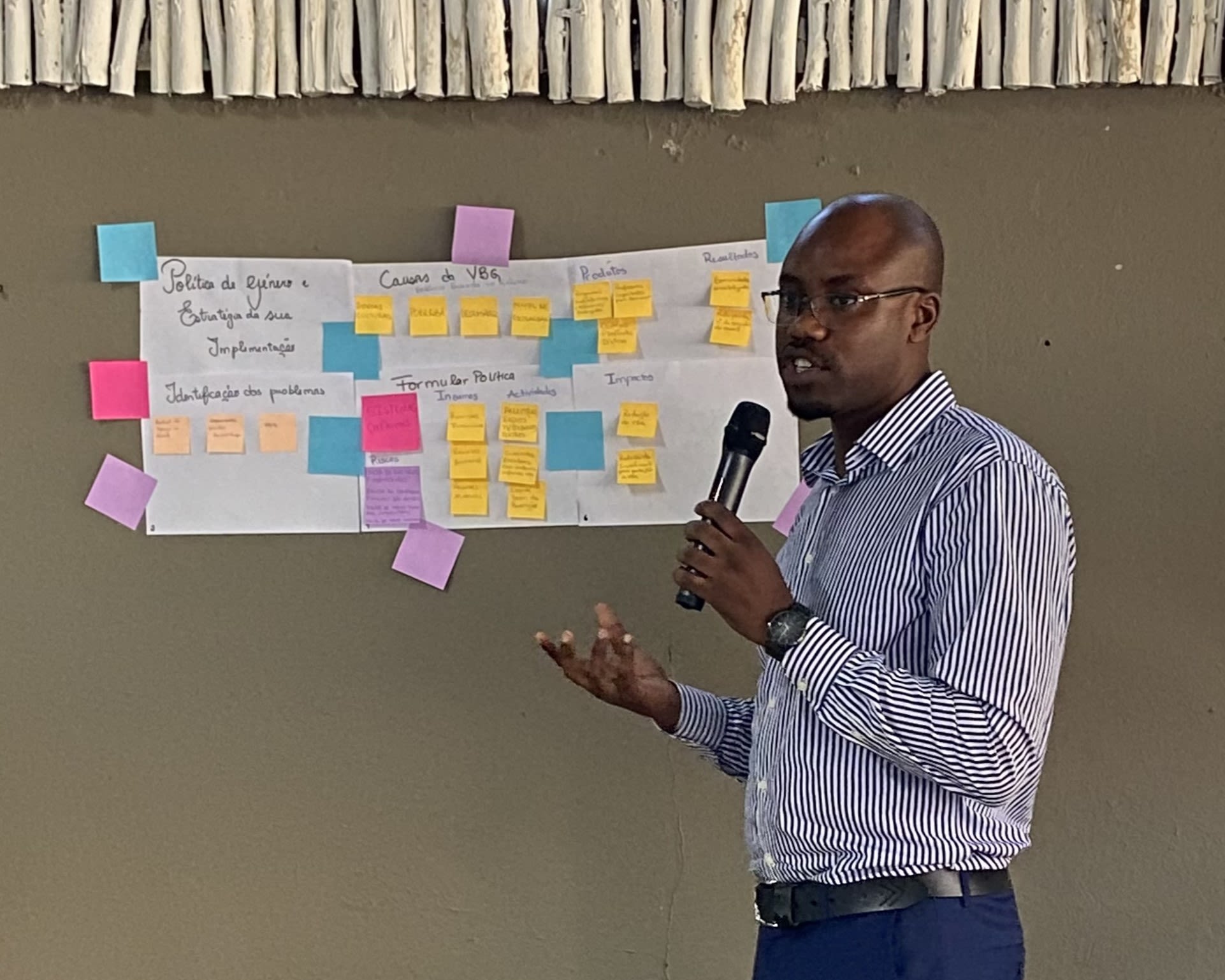
"Step 5: Better Evidence Generated" and
"Step 6: Evidence Used for Better Policies"
The support provided to strengthen monitoring and/or evaluation systems (Step 4) should lead to better evidence being generated, for example, through the commissioning of evaluations. GEI may also support pilot evaluations, bridging Steps 4 and 5. Step 6 describes situations where evidence generated through evaluations or through strengthened M&E systems is being used to inform decision-making and policy development.
Cape Verde is strengthening its capacity to conduct and use impact evaluations. In 2022, a government evaluation team, under the mentorship of CLEAR-LAB, undertook a rapid evaluation of Cape Verde’s land management policy. In March 2023, the Government of Cape Verde, represented by its Deputy Prime Minister and Minister of Finance, launched their Guide on Impact Evaluations, which was developed with the support of CLEAR-LAB.
India: Under its long-term collaboration with the Government of Tamil Nadu, CLEAR-SA supported the Department of Economics and Statistics with training on questionnaire design, data collection and data quality, in support of the state’s first elderly panel survey. Key findings of this landmark evaluation are informing policies on the elderly in the state. (See “Reflections on … Gender Data”).
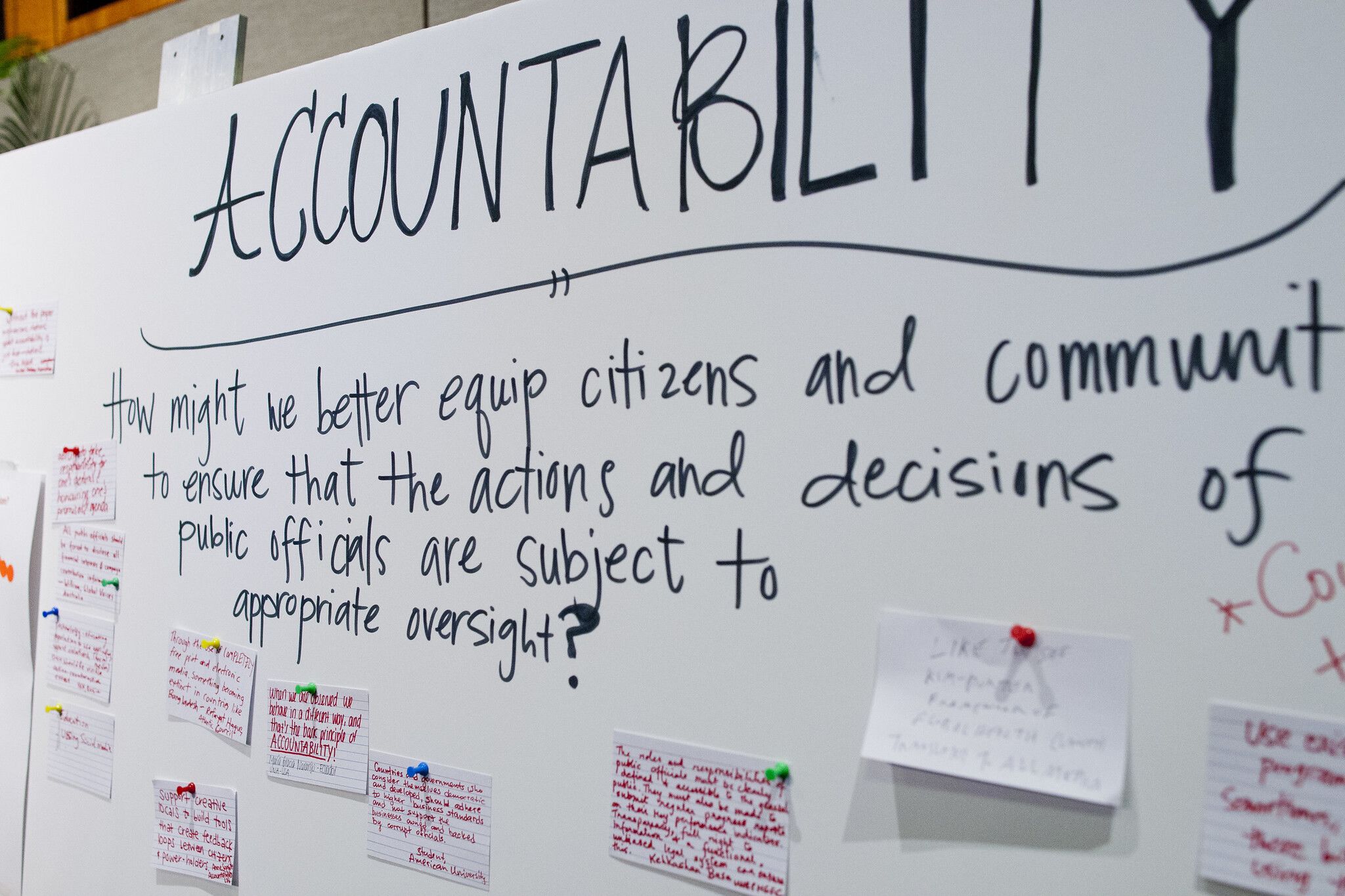
Reflection on..
Gender Data
According to UN Women, despite some progress towards achieving the United Nation’s Sustainable Development Goal (SDG) targets on gender, only 42 percent of the gender data that is needed to monitor the gender-specific dimensions of the SDGs was available. Data from administrative systems can serve as an important source for addressing such data gaps.
Administrative Data Systems Need Strengthening. Strengthening administrative data systems and building the capacity of public-sector staff to use administrative data is vital. It helps to address gender data gaps and strengthen national M&E systems while supporting national policy goals on gender. CLEAR-SA has been working closely with government partners in India to improve their data systems, including advising on data policy, improving data collection practices, and supporting government data analytics units, among other activities. CLEAR-SA’s work with the Department of School Education in Tamil Nadu with helping them mine the Education Monitoring and Information System database is being leveraged by the government to conduct two evaluation studies: one to identify gaps in cash transfer schemes for women and nutritional deficiencies in adolescent girls, and the second to understand gaps in higher education enrolment with a focus on girls.
- BL 2 -
Training and Professional Development
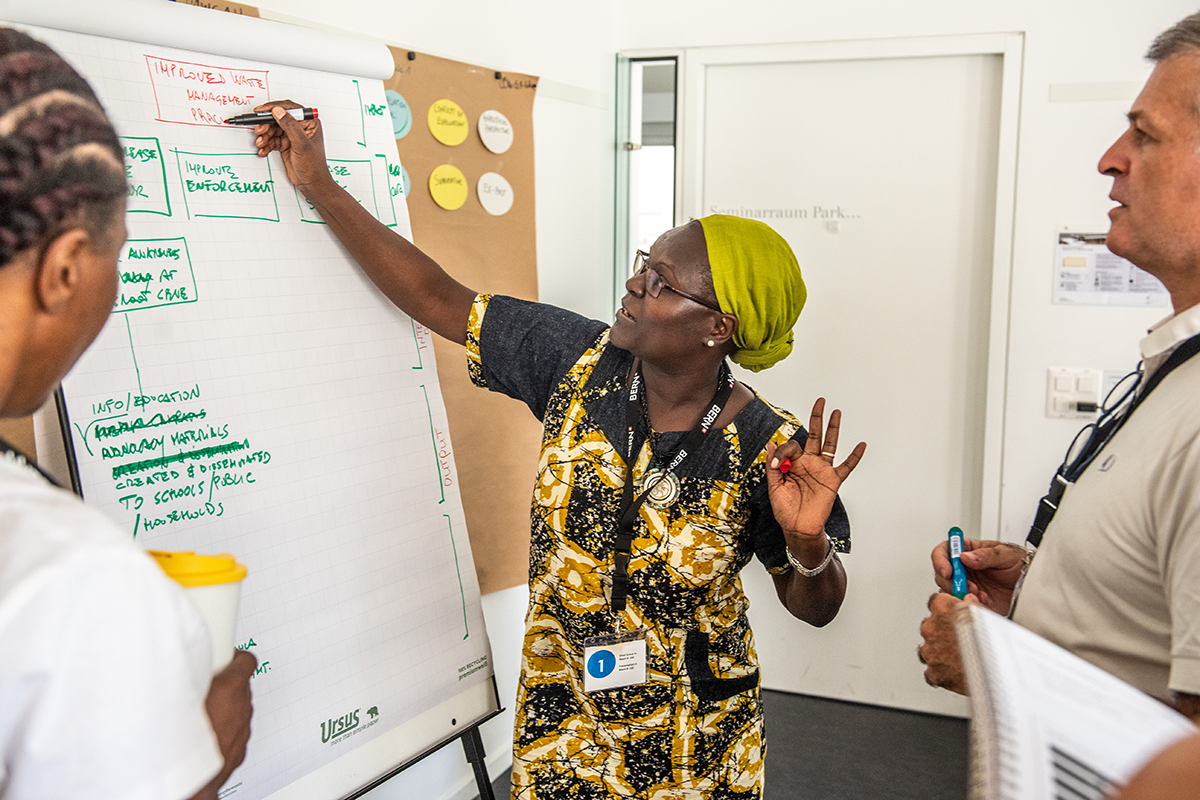
Through a range of training, learning, and professional development activities, GEI equips government decision-makers, evaluators, and other M&E stakeholders with the tools and skills required to understand the role of M&E and evidence in decision-making; to gather, analyze, and use evaluative knowledge; to conduct evaluations; and to better manage and use M&E systems.
Flagship Global and Regional Training Programs
GEI’s Implementing Partners, IPDET and ENAP, deliver M&E training that targets regional and global M&E stakeholders.
IPDET: The first, post-COVID in-person IPDET program was conducted in July of 2022 and brought together 138 participants from 63 countries, with the largest share of participants coming from Sub-Saharan Africa, East Asia, and the Pacific. The IPDET program allows participants to enhance their knowledge and skills in evaluation and develop networks for future collaboration with co-learners from all over the world.
ENAP: ENAP continued its strong delivery of training for French and Arabic-speaking audiences (in collaboration with regional stakeholders in Francophone Africa and MENA). ENAP delivered its PIFED program in Djibouti in November 2022. ENAP also delivered TAQYEEM, the first international evaluation program in the Arabic language. TAQYEEM was offered both online and in-person during the reporting period. In November 2022, 31 participants from 7 different MENA countries (Egypt, Jordan, Oman, Sudan, Syria, Palestine, and Yemen), attended a 3-week long TAQYEEM course online. The participants came from governmental organizations that play strategic roles in their national M&E systems. Syria, Yemen, Palestine and Sudan are considered fragile and conflict-affected countries by the World Bank.
Customized Training Offers
GEI Implementing Partners deliver a variety of customized training programs to strategic partners all over the world. Examples include:
CLEAR-PCA ran the second session of an online Monitoring & Evaluation Boot Camp, developed for Young and Emerging Evaluators (YEEs) to help bridge the gap between university learning and hands-on experience. It focused on essential skills and concepts required for program design, management, and evaluation. Over 70% of the 97 participants were women.
CLEAR-AA delivered a 5-part master class on evidence use in parliaments in Zambia, in collaboration with the National Assembly of Zambia (NAZ). The primary goal was to enhance the capacity and effectiveness of NAZ in implementing evidence-based principles for policy decisions. The masterclass provided senior managers and strategic plan implementation focal points in NAZ with the knowledge and skills needed to integrate evidence into parliamentary processes.
CLEAR-SA conducted its annual flagship open enrollment training course on Evaluating Social Programs. Conducted virtually, this course brought together 35 participants from organizations such as UNICEF, the International Rescue Committee, the Indian Institute of Public Health, Save the Children International, and the International Labour Organisation, among others from across India, Bangladesh, Afghanistan, and Nepal. The six-day course explored how impact evaluations can be used to rigorously measure whether a program works, the methods and considerations for their design and implementation, and how findings can inform evidence-based policies and programs.
IPDET conducted its first on-site training on evaluation for parliamentarians and parliament staff from the Asia Pacific region. The training was held in partnership with the Asia Pacific Evaluation Association (APEA), Global Parliamentarians Forum for Evaluation (GPFE), and Asia Pacific Parliamentarians Forum for Evaluation (APPFE), and had 46 participants from 18 countries. The four-day training aimed to provide participants with knowledge and tools to be able to actively use evaluative evidence in parliamentary debates, better justify policy decisions to the public, strengthen oversight roles, and fulfill constitutional duties.
CLEAR-FA developed a training program for evaluators, M&E managers, and evaluation sponsors on youth in evaluations. The goal is to provide participants with new perspectives on their evaluation practices and give them the tools and concepts to enable them to better integrate youth-sensitive elements into their evaluations. The training will be delivered in early FY24.
GEI Working Group on Training
and Professional Development
The Working Group on Training and Professional Development, which includes both GEI Implementing and Associate Partners, met quarterly to discuss highlights, lessons, and strategic issues emanating from training and professional development experiences across the GEI Network. In the framework of the Working Group, several collaborative activities among GEI partners were completed. One example is GEI’s Hands-on Learning Program which was successfully piloted in four CLEAR Centers with five interns in the summer of 2022. The program is currently being scaled up for FY24 and will include new hosts for the interns such as M&E units in the centers of government in Colombia, Costa Rica, and Mexico. (See “Reflections on … Youth”.) Another example is the development of the global directory of academic training programs in evaluation which was launched on the BetterEvaluation platform. The Working Group will also support the development of a competency framework that will enhance the relevance and effectiveness of training and professional development across the GEI Network and will guide the development of curricula and content across the GEI Network.
Technical Assistance to Country-Led Evaluations
GEI, in collaboration with the OECD-DAC Secretariat, has been providing technical assistance to country-led evaluations of national COVID-19 policy responses in three countries: Malawi, Ghana, and Burkina Faso. Led by CLEAR-AA, the work in Malawi is in the most advanced stage and is currently in the data analysis and reporting phase. Work in the other two countries is in the inception phase. In Ghana, an evaluability assessment was conducted to provide inputs to the scope and design of the national COVID response evaluation.
Through a range of training, learning, and professional development activities, GEI equips government decision-makers, evaluators, and other M&E stakeholders with the tools and skills required to understand the role of M&E and evidence in decision-making; to gather, analyze, and use evaluative knowledge; to conduct evaluations; and to better manage and use M&E systems.
Flagship Global and Regional Training Programs
GEI’s Implementing Partners, IPDET and ENAP, deliver M&E training that targets regional and global M&E stakeholders.
IPDET: The first, post-COVID in-person IPDET program was conducted in July of 2022 and brought together 138 participants from 63 countries, with the largest share of participants coming from Sub-Saharan Africa, East Asia, and the Pacific. The IPDET program allows participants to enhance their knowledge and skills in evaluation and develop networks for future collaboration with co-learners from all over the world.
ENAP: ENAP continued its strong delivery of training for French and Arabic-speaking audiences (in collaboration with regional stakeholders in Francophone Africa and MENA). ENAP delivered its PIFED program in Djibouti in November 2022. ENAP also delivered TAQYEEM, the first international evaluation program in the Arabic language. TAQYEEM was offered both online and in-person during the reporting period. In November 2022, 31 participants from 7 different MENA countries (Egypt, Jordan, Oman, Sudan, Syria, Palestine, and Yemen), attended a 3-week long TAQYEEM course online. The participants came from governmental organizations that play strategic roles in their national M&E systems. Syria, Yemen, Palestine and Sudan are considered fragile and conflict-affected countries by the World Bank.
Customized Training Offers
GEI Implementing Partners deliver a variety of customized training programs to strategic partners all over the world. Examples include:
CLEAR-PCA ran the second session of an online Monitoring & Evaluation Boot Camp, developed for Young and Emerging Evaluators (YEEs) to help bridge the gap between university learning and hands-on experience. It focused on essential skills and concepts required for program design, management, and evaluation. Over 70% of the 97 participants were women.
CLEAR-AA delivered a 5-part master class on evidence use in parliaments in Zambia, in collaboration with the National Assembly of Zambia (NAZ). The primary goal was to enhance the capacity and effectiveness of NAZ in implementing evidence-based principles for policy decisions. The masterclass provided senior managers and strategic plan implementation focal points in NAZ with the knowledge and skills needed to integrate evidence into parliamentary processes.
CLEAR-SA conducted its annual flagship open enrollment training course on Evaluating Social Programs. Conducted virtually, this course brought together 35 participants from organizations such as UNICEF, the International Rescue Committee, the Indian Institute of Public Health, Save the Children International, and the International Labour Organisation, among others from across India, Bangladesh, Afghanistan, and Nepal. The six-day course explored how impact evaluations can be used to rigorously measure whether a program works, the methods and considerations for their design and implementation, and how findings can inform evidence-based policies and programs.
IPDET conducted its first on-site training on evaluation for parliamentarians and parliament staff from the Asia Pacific region. The training was held in partnership with the Asia Pacific Evaluation Association (APEA), Global Parliamentarians Forum for Evaluation (GPFE), and Asia Pacific Parliamentarians Forum for Evaluation (APPFE), and had 46 participants from 18 countries. The four-day training aimed to provide participants with knowledge and tools to be able to actively use evaluative evidence in parliamentary debates, better justify policy decisions to the public, strengthen oversight roles, and fulfill constitutional duties.
CLEAR-FA developed a training program for evaluators, M&E managers, and evaluation sponsors on youth in evaluations. The goal is to provide participants with new perspectives on their evaluation practices and give them the tools and concepts to enable them to better integrate youth-sensitive elements into their evaluations. The training will be delivered in early FY24.
GEI Working Group on Training
and Professional Development
The Working Group on Training and Professional Development, which includes both GEI Implementing and Associate Partners, met quarterly to discuss highlights, lessons, and strategic issues emanating from training and professional development experiences across the GEI Network. In the framework of the Working Group, several collaborative activities among GEI partners were completed. One example is GEI’s Hands-on Learning Program which was successfully piloted in four CLEAR Centers with five interns in the summer of 2022. The program is currently being scaled up for FY24 and will include new hosts for the interns such as M&E units in the centers of government in Colombia, Costa Rica, and Mexico. (See “Reflections on … Youth”.) Another example is the development of the global directory of academic training programs in evaluation which was launched on the BetterEvaluation platform. The Working Group will also support the development of a competency framework that will enhance the relevance and effectiveness of training and professional development across the GEI Network and will guide the development of curricula and content across the GEI Network.
Technical Assistance to Country-Led Evaluations
GEI, in collaboration with the OECD-DAC Secretariat, has been providing technical assistance to country-led evaluations of national COVID-19 policy responses in three countries: Malawi, Ghana, and Burkina Faso. Led by CLEAR-AA, the work in Malawi is in the most advanced stage and is currently in the data analysis and reporting phase. Work in the other two countries is in the inception phase. In Ghana, an evaluability assessment was conducted to provide inputs to the scope and design of the national COVID response evaluation.
Reflection on..
Youth
Young people play a fundamental role in supporting monitoring, evaluation, and evidence use in developing countries as emerging evaluators and, in general, as drivers of change.
Youth Must be Included in Evaluations: Many countries are making significant investments in policies and programs targeting youth. Consequently, there is a need to strengthen M&E systems to better consider the lived experiences of youth to improve decision-making and performance of policies and programs affecting them. Unfortunately, evaluators often lack the skillset to conduct evaluations that allow young people to participate or that explore the needs of youth in a more comprehensive manner.
Young and Emerging Evaluators (YEEs) Need Professional Development Support: Investing in building the capacity of a new generation of local evaluators is essential to strengthening M&E ecosystems, as well as creating opportunities for new and diverse voices to enter the profession. YEEs have the potential to drive change in the M&E field, helping it be more responsive to today’s complex, interconnected challenges like climate change, poverty, and food insecurity. However, YEEs often face obstacles with accessing M&E training and knowledge, developing professional networks, and finding job opportunities that help them develop their practical skills.
- BL 3 -
Developing, Curating and Amplifying Knowledge on M&E
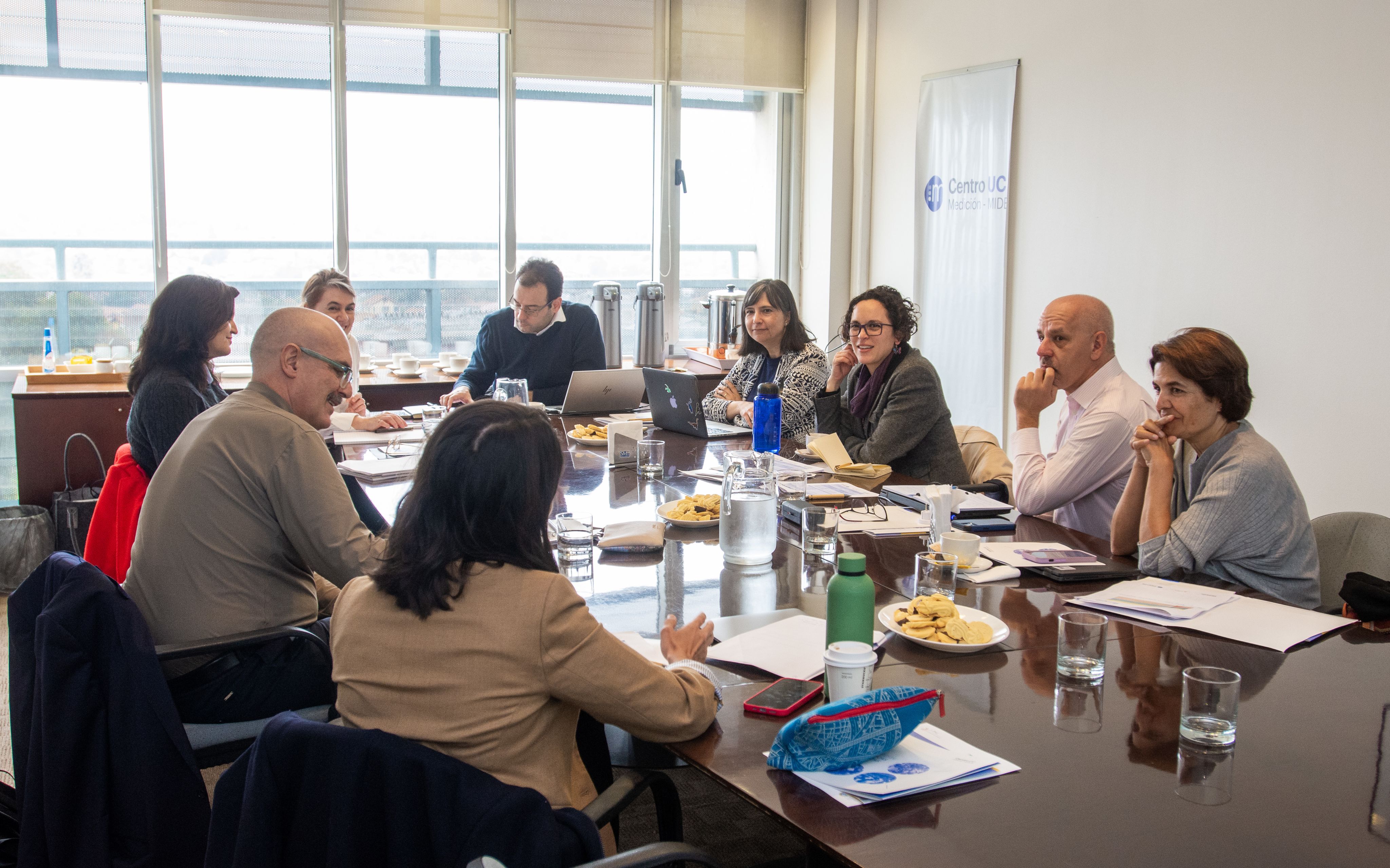
GEI captures and curates innovative M&E knowledge as well as practical on-the-ground experience - sharing it globally and locally. Facilitating knowledge transfer across geographic and cultural boundaries, GEI focuses on South-South exchange and how to adapt global lessons and best practices to local contexts.
Expanded Knowledge Platform
In late 2022, BetterEvaluation, GEI’s knowledge platform, went through a complete site overhaul to improve its user interface, security, and performance. After its re-launch, GEI focused on the development of additional sections and pages that offer new content. Two new directories were added to the platform including the first-ever global directory of academic training programs in evaluation, the result of a successful collaboration between the GEI, Claremont Graduate University, and an international group of experts. In addition, the first directory of recurrent training and professional development activities offered by the GEI Network was added. New curated content in thematic areas such as environment, gender, and grant-making was also added to the platform.
To maintain the highest standards of quality, accuracy, and relevance of material for the platform, GEI set up a Content Review Panel. This panel plays a central role in reviewing and providing feedback on content submissions and ensuring that the resources posted on BetterEvaluation are up-to-date, comprehensive, and adhere to best practices.
Strengthened GEI Network Communications
The newly established network of communication focal points from GEI Implementing Partners has enhanced the coordination of communication efforts related to GEI events and the systematic collection of knowledge products generated at the national level. This improved coordination has enabled the GEI Network to increase its information-sharing across various platforms. GEI’s digital presence continues to experience organic growth, reaching over 1.2 million users annually.
Increased Emphasis on South-South Knowledge Exchange
GEI has fostered a vibrant community of global M&E stakeholders who are eager to learn from each other and share their challenges, successes, and lessons learned. This emphasis on peer-to-peer learning is strongly supported by government officials and NGO representatives who have found it to be the most valuable and engaging approach. In FY23, GEI supported the following knowledge exchange events:
National Evaluation Capacities (NEC) Conference: GEI co-hosted with UNDP-IEO the NEC in Turin in October 2022, where over 300 participants from more than 100 countries shared knowledge on M&E systems development.
NEC+6: Six months later, the GEI also hosted “NEC+6: Taking Forward the Turin Agenda,” an online conference that explored what gender-responsive and climate-informed evaluation systems look like. The event was attended by over 450 participants, who joined from 120+ countries. This event will be followed by similar events, titled “NEC+12” and “NEC+18.” (See “Reflections on … Knowledge on M&E”.)
gLOCAL Evaluation Week: GEI supported the organization of its annual gLOCAL Evaluation Week, one of the largest M&E knowledge-sharing events in the world. During gLOCAL 2023, 304 events were organized and carried out by hundreds of organizers all over the world. It has been estimated that during gLOCAL approximately 20,000 people from 126 countries participated in online, in-person, and hybrid events.
Table 1 - Total Outreach of GEI Network (Global Team and Implementing partners) during FY23

GEI captures and curates innovative M&E knowledge as well as practical on-the-ground experience - sharing it globally and locally. Facilitating knowledge transfer across geographic and cultural boundaries, GEI focuses on South-South exchange and how to adapt global lessons and best practices to local contexts.
Expanded Knowledge Platform
In late 2022, BetterEvaluation, GEI’s knowledge platform, went through a complete site overhaul to improve its user interface, security, and performance. After its re-launch, GEI focused on the development of additional sections and pages that offer new content. Two new directories were added to the platform including the first-ever global directory of academic training programs in evaluation, the result of a successful collaboration between the GEI, Claremont Graduate University, and an international group of experts. In addition, the first directory of recurrent training and professional development activities offered by the GEI Network was added. New curated content in thematic areas such as environment, gender, and grant-making was also added to the platform.
To maintain the highest standards of quality, accuracy, and relevance of material for the platform, GEI set up a Content Review Panel. This panel plays a central role in reviewing and providing feedback on content submissions and ensuring that the resources posted on BetterEvaluation are up-to-date, comprehensive, and adhere to best practices.
Strengthened GEI Network Communications
The newly established network of communication focal points from GEI Implementing Partners has enhanced the coordination of communication efforts related to GEI events and the systematic collection of knowledge products generated at the national level. This improved coordination has enabled the GEI Network to increase its information-sharing across various platforms. GEI’s digital presence continues to experience organic growth, reaching over 1.2 million users annually.
Increased Emphasis on South-South Knowledge Exchange
GEI has fostered a vibrant community of global M&E stakeholders who are eager to learn from each other and share their challenges, successes, and lessons learned. This emphasis on peer-to-peer learning is strongly supported by government officials and NGO representatives who have found it to be the most valuable and engaging approach. In FY23, GEI supported the following knowledge exchange events:
National Evaluation Capacities (NEC) Conference: GEI co-hosted with UNDP-IEO the NEC in Turin in October 2022, where over 300 participants from more than 100 countries shared knowledge on M&E systems development.
NEC+6: Six months later, the GEI also hosted “NEC+6: Taking Forward the Turin Agenda,” an online conference that explored what gender-responsive and climate-informed evaluation systems look like. The event was attended by over 450 participants, who joined from 120+ countries. This event will be followed by similar events, titled “NEC+12” and “NEC+18.” (See “Reflections on … Knowledge on M&E”.)
gLOCAL Evaluation Week: GEI supported the organization of its annual gLOCAL Evaluation Week, one of the largest M&E knowledge-sharing events in the world. During gLOCAL 2023, 304 events were organized and carried out by hundreds of organizers all over the world. It has been estimated that during gLOCAL approximately 20,000 people from 126 countries participated in online, in-person, and hybrid events.
Table 1 - Total Outreach of GEI Network (Global Team and Implementing partners) during FY23

Reflection on..
Knowledge on M&E
Both In-person and Online Knowledge Exchange/Training are Necessary: As the COVID pandemic has gradually receded, the GEI network witnessed a resurgence of in-person training and meetings. Simultaneously, investments made in online and hybrid approaches during the height of COVID led to a sustained increase in online and hybrid training and knowledge exchange options within the GEI Network. However, online learning brings with it certain limitations, including a lack of opportunity for informal conversations that can hinder relationship building and trust. For instance, creating an environment for informal peer-to-peer exchanges - like those that happened on the periphery of the NEC 2022 Conference – allows government officials to share ideas with peers and find a supportive network.
Knowledge Resources Must be Tailored: In today’s information-saturated world, users want easy-to-find answers to their specific challenges and questions. Knowledge products and user interfaces should be developed to respond to particular needs and help users find accurate information quickly.
Platforms/Tools Should Evolve to Meet User Demands: Artificial Intelligence (AI) technologies are becoming embedded in the tools people use daily and are creating new habits in how people search and consume information. GEI must respond to the changing needs of users. For example, enhancing GEI’s knowledge platform, BetterEvaluation, with AI-powered functions would allow users to more easily access the reliable, vetted, and unbiased information found on the site.
GEI in Numbers
(April 2022 - June 2023)
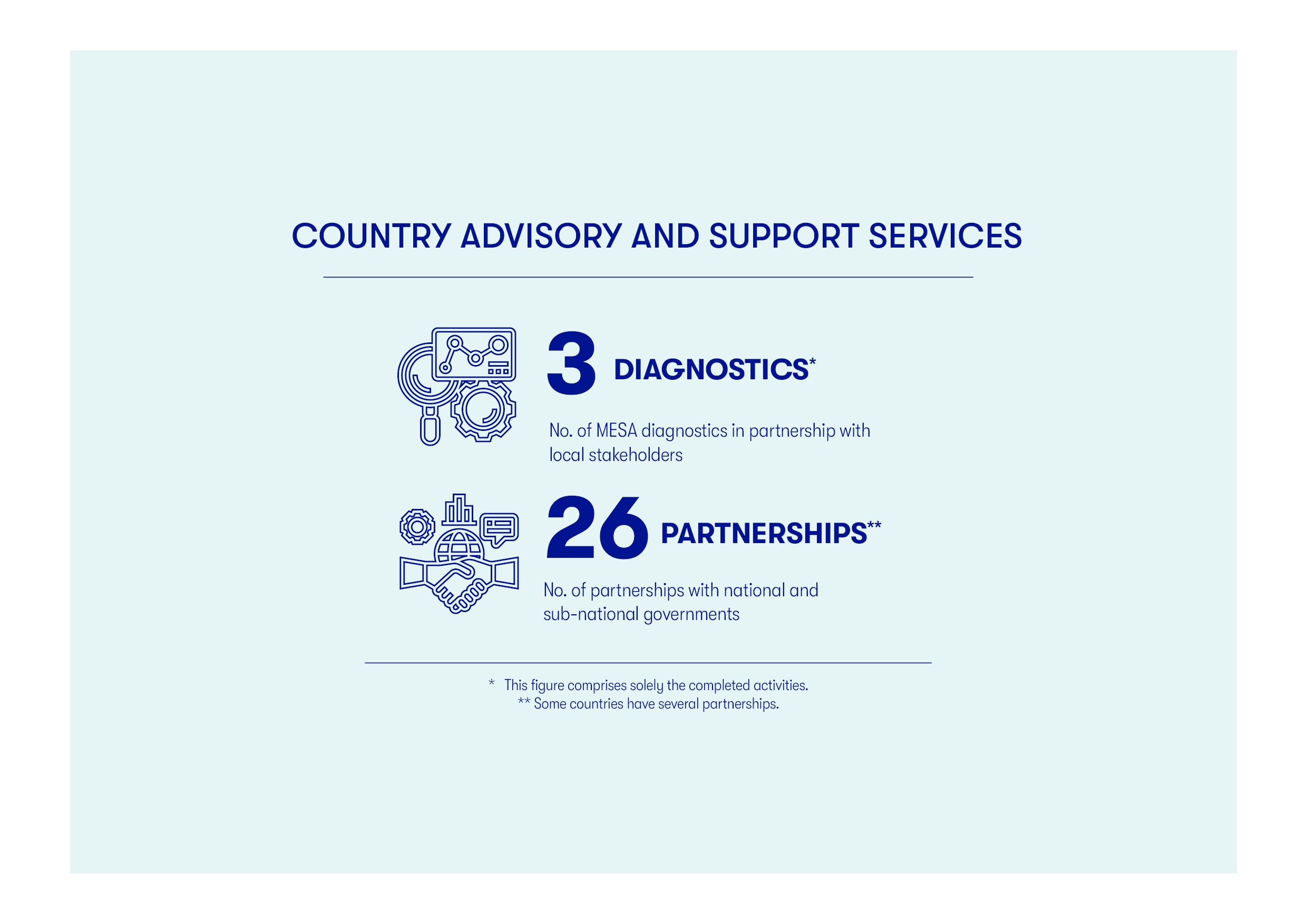
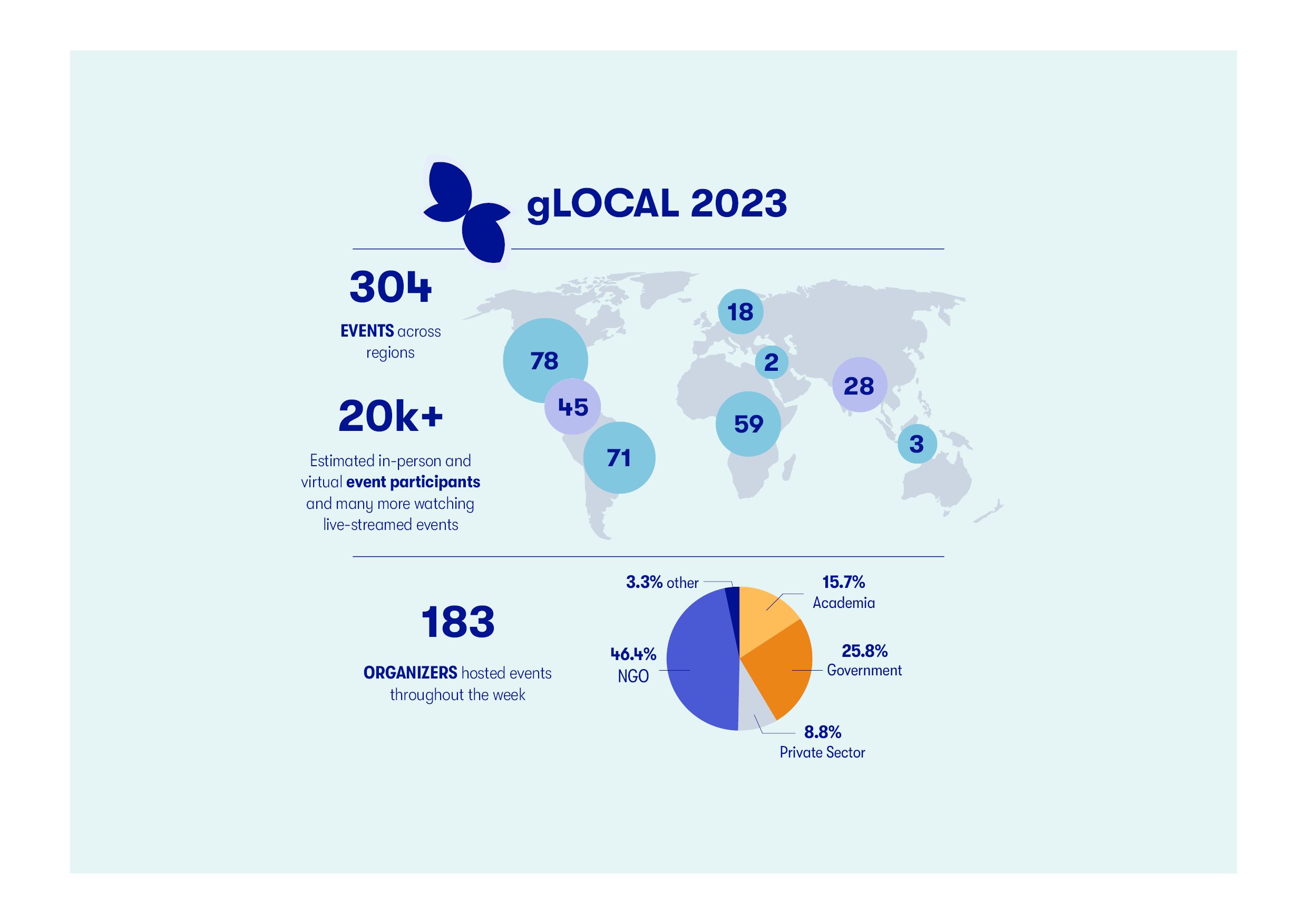
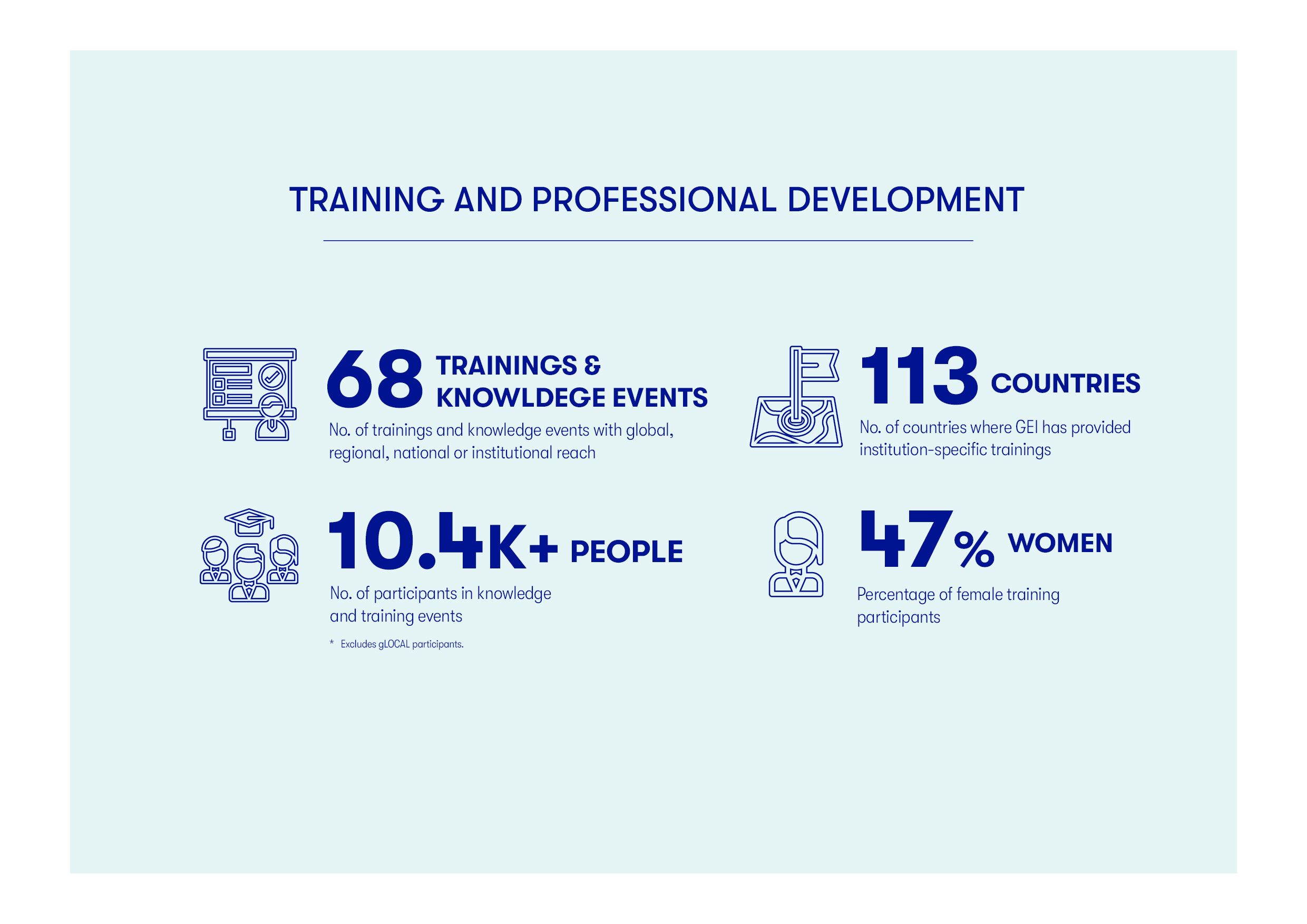
Financials
These financial statements include all GEI contributions and expenses from inception in October 2020 through end-June 2023.
The statements shown here are unaudited. Internal audits are performed by the World Bank Group Quality Assurance. GEI also participates in the World Bank Group’s single audit exercise annually. The single audit is generally released in September after the conclusion of the WBG fiscal year.
Through June 2023, donors have generously contributed $21.78 million to GEI, and have formally committed to a total of $32.36 million to-date.
Since their endorsement at the GEI Partnership Council, the GEI Global Team has been preparing grants to partners aligned with the amounts agreed with donors. The grants have benefitted from strong collaboration with partners, UNDP country offices and World Bank teams to ensure they are strongly aligned and reduce fragmentation.
We recognize and appreciate the support of the UNDP’s Independent Evaluation Office and the German Institute for Development Evaluation which provide full-time staff members working as part of the GEI’s Global Team.
All financial data and all dollar amounts are US dollars unless otherwise indicated.
Table 2 - Commitments and Actual Contributions to GEI by Funding Agency
| DONOR | Committed amounts until Dec. 2025 (in USD) | Actual Contributions (in USD) |
|---|---|---|
| Netherlands-Ministry of Foreign Affairs | 2,377,381 | 1,849,581 |
| Germany - Bundesministerium fur Wirtschaftliche Zusammenarbeit | 3,725,750 | 3,725,750 |
| Swedish International Development Cooperation Agency (Sida) | 5,153,079 | 3,326,428 |
| Finland - Ministry for Foreign Affairs | 305,925 | 305,925 |
| Danish Ministry of Foreign Affairs (DANIDA) | 491,964 | 491,964 |
| United Nations Development Programme (UNDP) | 550,000 | 550,000 |
| Inter-American Development Bank (IDB) | 1,500,000 | 1,500,000 |
| International Fund for Agricultural Development (IFAD) | 390,000 | 390,000 |
| Canada - Department of Foreign Affairs, Trade and Development | 1,285,433 | 552,026 |
| Swiss Agency for Development and Cooperation (SDC) | 1,364,397 | 669,411 |
| Camões - Instituto da Cooperação e da Língua, IP | 11,292 | 11,292 |
| World Bank IEG | 15,208,000 | 8,408,000 |
| Total | 32,363,221 | 21,780,377 |
Table 3 - Grant Amounts and Disbursement Schedule by Recipient
| GRANT | Grant amounts disbursed in USD | TOTAL (FY22-25) | |||
|---|---|---|---|---|---|
| FY22 | FY23 | FY24 | FY25 | ||
| IPDET | 1,460,000 | - | 687,000 | 620,000 | 2,767,000 |
| ENAP | 250,000 | - | 265,000 | 250,000 | 765,000 |
| CLEAR-AA | 650,000 | 650,000 | 650,000 | - | 1,950,000 |
| CLEAR-FA | - | 875,000 | 565,000 | 565,000 | 2,005,000 |
| CLEAR-LAB | 736,000 | 736,000 | 792,000 | - | 2,264,000 |
| CERP | - | 750,000 | 305,000 | 305,000 | 1,360,000 |
| CLEAR-SA | 852,516 | - | 487,040 | - | 1,339,556 |
| CLEAR-LAC | - | - | 500,000 | 500,000 | 1,000,000 |
| Total per year | 3,948,516 | 3,011,000 | 4,251,040 | 2,240,000 | 13,450,556 |
| Cumulative disbursement | 3,948,516 | 6,959,516 | 11,210,556 | 13,450,556 | |
Financials
These financial statements include all GEI contributions and expenses from inception in October 2020 through end-June 2023.
The statements shown here are unaudited. Internal audits are performed by the World Bank Group Quality Assurance. GEI also participates in the World Bank Group’s single audit exercise annually. The single audit is generally released in September after the conclusion of the WBG fiscal year.
Through June 2023, donors have generously contributed $21.78 million to GEI, and have formally committed to a total of $32.36 million to-date.
Since their endorsement at the GEI Partnership Council, the GEI Global Team has been preparing grants to partners aligned with the amounts agreed with donors. The grants have benefitted from strong collaboration with partners, UNDP country offices and World Bank teams to ensure they are strongly aligned and reduce fragmentation.
We recognize and appreciate the support of the UNDP’s Independent Evaluation Office and the German Institute for Development Evaluation which provide full-time staff members working as part of the GEI’s Global Team.
All financial data and all dollar amounts are US dollars unless otherwise indicated.
Table 2 - Commitments and Actual Contributions to GEI by Funding Agency
| DONOR | Committed amounts until Dec. 2025 (in USD) | Actual Contributions (in USD) |
|---|---|---|
| Netherlands-Ministry of Foreign Affairs | 2,377,381 | 1,849,581 |
| Germany - Bundesministerium fur Wirtschaftliche Zusammenarbeit | 3,725,750 | 3,725,750 |
| Swedish International Development Cooperation Agency (Sida) | 5,153,079 | 3,326,428 |
| Finland - Ministry for Foreign Affairs | 305,925 | 305,925 |
| Danish Ministry of Foreign Affairs (DANIDA) | 491,964 | 491,964 |
| United Nations Development Programme (UNDP) | 550,000 | 550,000 |
| Inter-American Development Bank (IDB) | 1,500,000 | 1,500,000 |
| International Fund for Agricultural Development (IFAD) | 390,000 | 390,000 |
| Canada - Department of Foreign Affairs, Trade and Development | 1,285,433 | 552,026 |
| Swiss Agency for Development and Cooperation (SDC) | 1,364,397 | 669,411 |
| Camões - Instituto da Cooperação e da Língua, IP | 11,292 | 11,292 |
| World Bank IEG | 15,208,000 | 8,408,000 |
| Total | 32,363,221 | 21,780,377 |
Table 3 - Grant Amounts and Disbursement Schedule by Recipient
| GRANT | Grant amounts disbursed in USD | TOTAL (FY22-25) | |||
|---|---|---|---|---|---|
| FY22 | FY23 | FY24 | FY25 | ||
| IPDET | 1,460,000 | - | 687,000 | 620,000 | 2,767,000 |
| ENAP | 250,000 | - | 265,000 | 250,000 | 765,000 |
| CLEAR-AA | 650,000 | 650,000 | 650,000 | - | 1,950,000 |
| CLEAR-FA | - | 875,000 | 565,000 | 565,000 | 2,005,000 |
| CLEAR-LAB | 736,000 | 736,000 | 792,000 | - | 2,264,000 |
| CERP | - | 750,000 | 305,000 | 305,000 | 1,360,000 |
| CLEAR-SA | 852,516 | - | 487,040 | - | 1,339,556 |
| CLEAR-LAC | - | - | 500,000 | 500,000 | 1,000,000 |
| Total per year | 3,948,516 | 3,011,000 | 4,251,040 | 2,240,000 | 13,450,556 |
| Cumulative disbursement | 3,948,516 | 6,959,516 | 11,210,556 | 13,450,556 | |
